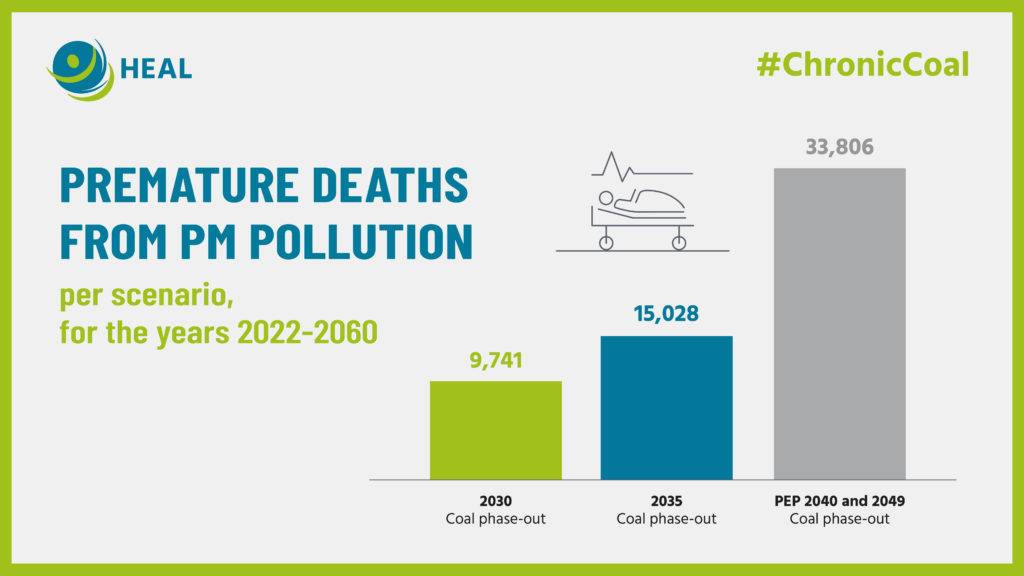Climate change, environmental pollution and biodiversity loss affect people’s health and generate multi-billion-euro economic losses, as a briefing produced by HEAL Poland under the patronage of the Institute of Water Economy and Meteorology of the National Research Institute and the Polish Federation of Asthma, Allergy, and COPD Patients Associations highlights.
Every year, air pollution in Poland reaches its highest levels during the smog season in winter. In view of the unacceptably high health burden and health costs from poor air quality, the Health and Environment Alliance (HEAL) and health experts urge the Polish government to increase efforts to reduce pollution in the energy sector. This includes setting a swift date for phasing out coal combustion in Poland, as well as accelerating the Just Transition in the energy sector.
The latest Lancet Countdown report has highlighted that coal burning worldwide contributes to 980,000 deaths annually. In Poland, air pollution leads to 47,000 premature deaths each year, and the burning of coal for energy generation or for heating in households is a major source of pollution.
Poland is the only EU country which hasn’t yet set a date for phasing out coal power generation.
“Poland is struggling with numerous consequences of climate change and air pollution. The common denominator of these problems in Poland is coal burning, which fuels greenhouse gas emissions and harmful air pollutants” emphasises Weronika Michalak, HEAL Poland Director.
Illness caused or linked to air pollution from coal burning includes cardiovascular and respiratory diseases, neurological and hormonal disorders, cancers, or – in milder cases – a deterioration in well-being. They are more broadly linked to a decrease in productivity, an increase in the number of sick leaves and hospitalizations, and the need to care for sick children and the elderly.
In the 2023 Chronic Coal Pollution Poland report, HEAL has shown it its report that the estimated health costs associated with air pollution emissions could reach as much as 422 billion zlotys if the transition away from coal occurs only in 2049.

The earlier Poland phases out coal power, the greater the health benefits and saved health costs to society will be.
HEAL’s report calculates the health effects and the resulting cost for the Polish society based on the emissions of PM2.5 and PM10 particulate matter, nitrogen dioxide and ozone. The report considers 3 scenarios for phasing out coal power (and combined heat) generation in Poland, with a 2030 phase out yielding the highest health benefits and cost savings, compared to a 2049 one.
Ending coal power generation by 2030 would, vis-a-vis a coal phase-out in 2049, avoid among other
- 494,399 additional days of asthma symptoms in asthmatic children
- 57,038 cases of bronchitis in healthy children
- 38,5 million restricted activity and lost work days
- 35,700 hospitalisations
- 24,000 premature deaths due to PM2.5 pollution only
Experts emphasise that setting an urgent date for phasing out the use of coal for heating and energy purposes in the KPEiK is necessary given the scale of the challenges. In an appeal to the Ministry of Climate and Environment, they call for the setting a specific and as soon as possible date for phasing out coal burning, taking into account a just transition; significant acceleration of the development of renewable energy sources as an alternative to fossil fuels; the ending of subsidising coal mining and burning, while simultaneously increasing support for low-emission solutions; and taking into account the health costs of the current energy system in climate policy plans.
“The sooner we move away from burning coal, the more health and lives of Poles we will be able to save. A healthy environment, clean air, and halting the climate crisis are goals that should guide the update of the Polish National Energy and Climate Plan and the swift implementation of the revised AAQD (Ambient Air Quality Directive),” said Dr. hab. n. med. Michał Krzyżanowski, visiting professor at Imperial College London, signatory of the appeal, and member of the Doctors for Climate group.
More on the HEAL Poland website: https://healpolska.pl/aktualnosci/poczatek-sezonu-smogowego-eksperci-zdrowia-wzywaja-do-pilnego-odejscia-od-wegla/

